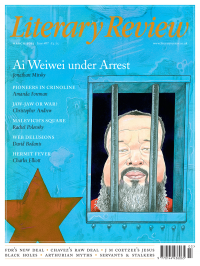Clare Clark
Quaker Notes
The Last Runaway
By Tracy Chevalier
HarperCollins 343pp £14.99
In the mid-19th century Ohio was a frontier state, a barely there straggle of settlements on the way to somewhere else, a staging post for pioneers pushing westwards and runaway slaves from the South fleeing north to Canada and freedom. Though Ohio itself was free, slave hunters haunted its trails and towns, tracking down runaways for a bounty. Their authority was strengthened in 1850 by the Fugitive Slave Law, which made it a criminal offence to give food or shelter to runaways, punishable by heavy fines and even imprisonment. Abolitionists dubbed it the ‘Bloodhound Law’ for the dogs that hunted down the fugitives. And still the slaves came, seeking refuge in the state’s network of some seven hundred safe houses, known locally as the Underground Railroad.
It is in this makeshift and uneasy land that Tracy Chevalier has chosen to set The Last Runaway, her seventh novel. An American who has lived in England for the past 28 years, Chevalier has never before written about her native country. Interestingly, she has chosen to observe it through

Sign Up to our newsletter
Receive free articles, highlights from the archive, news, details of prizes, and much more.@Lit_Review
Follow Literary Review on Twitter
Twitter Feed
Under its longest-serving editor, Graydon Carter, Vanity Fair was that rare thing – a New York society magazine that published serious journalism.
@PeterPeteryork looks at what Carter got right.
Peter York - Deluxe Editions
Peter York: Deluxe Editions - When the Going Was Good: An Editor’s Adventures During the Last Golden Age of Magazines by Graydon Carter
literaryreview.co.uk
Henry James returned to America in 1904 with three objectives: to see his brother William, to deliver a series of lectures on Balzac, and to gather material for a pair of books about modern America.
Peter Rose follows James out west.
Peter Rose - The Restless Analyst
Peter Rose: The Restless Analyst - Henry James Comes Home: Rediscovering America in the Gilded Age by Peter Brooks...
literaryreview.co.uk
Vladimir Putin served his apprenticeship in the KGB toward the end of the Cold War, a period during which Western societies were infiltrated by so-called 'illegals'.
Piers Brendon examines how the culture of Soviet spycraft shaped his thinking.
Piers Brendon - Tinker, Tailor, Sleeper, Troll
Piers Brendon: Tinker, Tailor, Sleeper, Troll - The Illegals: Russia’s Most Audacious Spies and the Plot to Infiltrate the West by Shaun Walker
literaryreview.co.uk